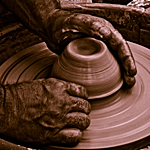Terry Gross on NPR’s Fresh Air shares a beautiful interview with author Colm Toibin which weaves through religion and ritual and beauty and faith. While the whole thing is worth a listen, I was struck by the last little bits of their conversation. Gross notes that Toibin dislikes the label ‘storyteller’ and the assumption that his gifts for writing come from the oral tradition of his Irish heritage.
Says he:
I hate being called a storyteller, because I’m a novelist. In other words, I hold and wield textures and tones and language. And if you think that it’s natural for me to do that, it is not.
Novel writing is an endeavor of endless craft and struggle and focus and flair. While novels can certainly tell stories, they are vastly more than storytelling. As for the oral tradition, Toibin has a response for that too:
I don’t come out of an oral tradition, I come out of silence… What I noticed most in my childhood or even in my adulthood was the silences between the words, the things that were not said. The reason why a story was told so that some other story, that was more true, might not be told. And it’s my job to tell that story.
I have a tendency sometimes, and I’ve seen the tendency in others, to place a populist frame around creative work. In an effort to encourage the ideas that ‘art is for everyone’ and ‘creativity is common to us all’ I play a bit fast and loose with the slow and focused craft of true artistry. Both extraordinary and more ‘ordinary’ expressions have value, both have purpose and place in our lives and in our world. But they’re different.
A favorite music review back in the 1980s said that “calling Bobby McFerrin a singer is alike calling the Grand Canyon a hole.”
Toibin’s remarks reminded me to take greater care in how I consider and discuss the difference between the exceptional and the simply expressive, between the canyon and the hole.



Thank you, Andrew. I enjoy your insights and find this one particularly meaningful at this time of year when we can so easily get swept up in the art fair and biennial deluge. It’s important to remember that while there can be a lot to sort through, there is work that is exceptional–the product of some pretty remarkable minds.
Spot on, Andrew. We artists are sometimes the victims of the sprezzatura we practice, the art that conceals art. We convey a sense of careless ease in the creation and production of our art, when in fact it is the result of work, grind, more work, more grind.